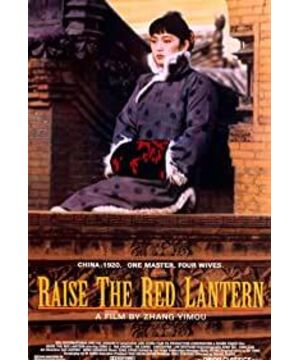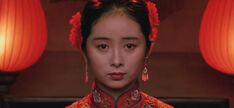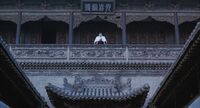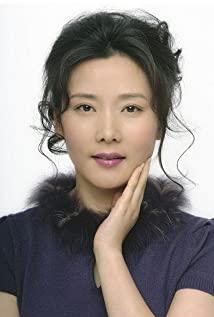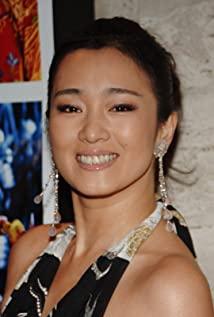1 There is no description of lanterns in the novel, the red lantern is added as a kind of symbol in the movie. Lighting, extinguishing, sealing, and lanterns have become the things that mark women's happiness and misfortune in a patriarchal society, throughout the film.
2 The scene of Song Lian making Yan’er swallow a piece of paper in “Wives and Concubines” was rewritten in large sections. What is shown in the film is that Song Lian exposed the fact that Yan’er was lighting the lamp privately in her room in public, so she was punished, and she eventually hated her. die.
3 The novel only writes that Song Lian is eager to get pregnant and to have children to support her position in the Chen family. And the fake pregnancy thing is only in the movie.
4 Mei Shan's affair with the doctor The novel only says that when Mei Shan was brought back by her servant, Zhuo Yun followed behind, eating melon seeds while walking. In the movie, it is mainly portrayed that Song Lian accidentally told the second wife Zhuo Yun about the incident after being drunk, which led to the arrest of the adulterer in bed. The film adaptation makes Songlian's crazy ending more plausible.
2. A few details
1. Song Lian's appearance in "The Wives and Concubines" has short hair, ear-length hair, and is bound with a sky blue ribbon. Gong Li's appearance in "The Big Red Lantern" is two thick braids.
2 There is a detailed description in "Wives and Concubines" that Chen Zuoqian took Songlian to see Yurushi, Yuru was chanting scriptures in the Buddhist hall, and when Songlian was about to go up to pay homage, the beads in Yuru's hand suddenly broke. Rolled to the ground, muttering words, sin, sin. This foreshadowing is not represented in the movie.
3 In "The Wives and Concubines", when Song Lian visited Feipu on her birthday, it was written that Song Lian was sipping wine alone, and vaguely heard the sound of familiar footsteps, the door curtain was slammed, and a dark man came in. man. Song Lian turned her face and looked at him for a long time, only to recognize that it was the eldest young master Feipu. She hurriedly covered all the leeks on the tablecloth bar so that Feipu wouldn't see it. In "The Big Red Lanterns", Songlian was already slightly drunk when Feipu visited, not only did not cover up the wine and food, but instead greeted Feipu generously to come and have a drink together.
3. About the characters
Personally, I think that the movie's portrayal of characters is more clear and mature.
1 Chen Zuoqian. There is no detailed description of Chen Zuoqian in the novel, it is just a supreme and pale and empty background in the whole story. In the movie, he was simply treated as a solemn and fuzzy back by the director. In Chen Zuoqian, Zhang Yimou and Su Tong want to express not too many differences. They are an old-fashioned man who is keen to have children and take concubines, living a large life of emptiness and decadence.
2 Philips. Feipu hinted at some kind of vitality. Unlike the men of the Chen family who are nostalgic for women, Feipu categorically denies this old-fashioned and pedantic life, and pursues freedom and new life. He is afraid of women. In the novel, Su Tong seems to intend to portray Feipu as a handsome and suave little GAY. There is a passage in the book that reads: Songlian saw them (the third young master of the silk king Gu family and Feipu) coming over from the window. , hand in hand. Song Lian felt that the two men walking hand in hand had a fresh and eccentric feeling. The movie omits these things. Philip's image is simpler and therefore more distinct.
3 geese. This is a character that the movie handles better than the novel, and it uses more lenses to reflect it, reflecting the shadow of Song Lian everywhere. The scene of secretly lighting a lamp in the room and imagining someone hammering her feet even more vividly expressed her wife's dream, and it was precisely because of such thoughts and the same proud and stubborn character as Songlian that she could not escape the tragic fate.
4 Meishan. This role He Saifei is really suitable to play. Those scenes of singing add a lot of color to the film, which is more suitable for her than the role of Xiaoca in "Red Pink" directed by Li Shaohong, another adaptation of Su Tong. But Mei Shan in the novel seems to be more coquettish and ghostly, the kind of feeling that can't be grasped, which is lost in the movie.
5 Finally, let's talk about Songlian. In the novel, Song Lian's student temperament was downplayed intentionally or unintentionally in the movie, and that submissive opinion and aura were almost covered up by Gong Li's powerful royal aura. There is a passage in "Wives and Concubines" that Chen Zuoqian and Song Lian met for the first time. The approximate scene is Song Lian's nineteenth birthday. Shan came, took out a large handful of small candles from the bag, and asked Chen Zuoqian to ask for a box of cakes. Song Lian lit the candle, watched the candle light up a small flame, and said, how lovely you look at the flame. She is clearly an image of a female student who is exquisitely carved and has not yet been deeply involved in the world, but when it comes to Gong Li's opening scene, she looks very bitter and sad.
Anyway, this may not be Su Tong's best novel, but the movie is probably one of Zhang Yimou's best works. Compared with the adaptation of Su Tong's other novel "Red Pink" three years later, "The Big Red Lantern" is fuller and smoother. If Zhang Yimou's works in recent years are like the beauties in PS photos, but they are always more stylized, then this film is like a woman in the 1980s. Although it can't be called perfect, it is three-dimensional and special. , it is worth remembering, making people nostalgic.
View more about Raise the Red Lantern reviews


